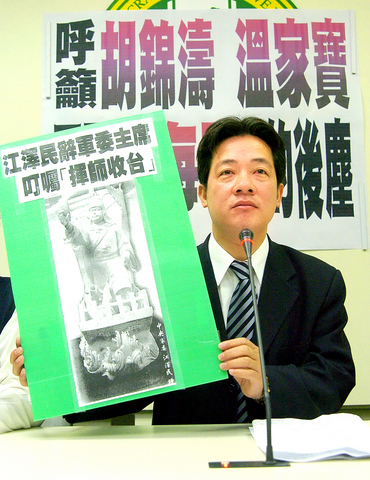The leaders of the nation's political parties should hold a summit to forge a united front against China's planned "anti-secession" law, the Democratic Progressive Party (DPP) caucus proposed yesterday.
"While the proposed legislation is expected to define Taiwan issues as a domestic affair [of China] and portray cross-strait tension as the legacy of the civil war between the Nationalist and Communist forces, we think it is necessary for our political leaders to meet and hammer out a counter-policy in response to the soon-to-be-passed law," DPP caucus whip Lai Ching-teh (賴清德) said.
Lai said that he plans to take up the proposal with Legislative Speaker and Chinese Nationalist Party (KMT) Vice Chairman Wang Jin-pyng (王金平) when Wang convenes the next round of cross-party talks, possibly sometime next week.

PHOTO: WANG MING-WEI, TAIPEI TIMES
"We'd like to see other legislative caucuses support the proposition and reach a consensus after the law is enacted," Lai said.
He said that once a consensus has been reached among the legislative caucuses, he would like to see caucus leaders going back to their individual parties to convince their party leaders to attend a summit.
Or better yet, Lai said, the summit can be proposed in the second legislative resolution scheduled to be made after the anti-secession law is passed by China's National People's Congress (NPC) on Monday.
Likening China's leadership to former Iraqi dictator Saddam Hussein, Lai called on Beijing to cancel the enactment of the anti-secession law immediately.
He said China's leaders should rein in their horses before they commit a serious blunder.
Peter Lin (
Lai's proposal of a leaders summit received mixed responses from other party caucuses. Taiwan Solidarity Union (TSU) legislative whip Lo Chih-ming (羅志明) said that his caucus supports the proposal, although he doubts that former president Lee Teng-hui (李登輝) would attend such a summit.
Lo said it sounds like a good idea for political leaders to sit down and hammer out counter-measures after the law has been enacted.
However, People First Party (PFP) caucus whip Chen Chih-bin (陳志彬) said that it would have made more sense if President Chen Shui-bian (陳水扁) had invited political leaders to discuss the matter, instead of letting the lawmaking body take the initiative.
"I don't have any problem with the political leaders summit, but I thought it would make more sense for the president to call the meeting, because it would be more time-consuming for the legislature to reach a consensus than having the president extend the invitation," he said.
KMT caucus whip Chen Chieh (陳杰) gave an evasive response.
"Although it sounds like a good idea and I am not averse to it, I don't think it is necessary, because the legislature has already passed a resolution to condemn the law and will make another one after the law has been enacted," he said.

US President Donald Trump said "it’s up to" Chinese President Xi Jinping (習近平) what China does on Taiwan, but that he would be "very unhappy" with a change in the "status quo," the New York Times said in an interview published yesterday. Xi "considers it to be a part of China, and that’s up to him what he’s going to be doing," Trump told the newspaper on Wednesday. "But I’ve expressed to him that I would be very unhappy if he did that, and I don’t think he’ll do that," he added. "I hope he doesn’t do that." Trump made the comments in

NOT AN OPENING: Trump’s violation of international law does not affect China’s consideration in attacking Taiwan; Beijing lacks capability, not precedent, an official said Taiwanese officials see the US’ capture of the president of Venezuela as a powerful deterrent to Beijing’s aggression and a timely reminder of the US’ ability to defeat militaries equipped with Chinese-made weapons. The strikes that toppled Venezuelan President Nicolas Maduro signaled to authoritarian leaders, including Chinese President Xi Jinping (習近平), US President Donald Trump’s willingness to use military might for international affairs core to US interests, one senior official in Taipei’s security circle said. That reassured Taiwan, the person said. Taipei has also dismissed the idea that Trump’s apparent violation of international law could embolden Beijing, said the official, who was not

A cold surge advisory was today issued for 18 cities and counties across Taiwan, with temperatures of below 10°C forecast during the day and into tonight, the Central Weather Administration (CWA) said. New Taipei City, Taipei, Taoyuan and Hsinchu, Miaoli and Yilan counties are expected to experience sustained temperatures of 10°C or lower, the CWA said. Temperatures are likely to temporarily drop below 10°C in most other areas, except Taitung, Pingtung, Penghu and Lienchiang (Matsu) counties, CWA data showed. The cold weather is being caused by a strong continental cold air mass, combined with radiative cooling, a process in which heat escapes from

Snow this morning fell on Alishan for the first time in seven years, as a strong continental cold air mass sent temperatures plunging across Taiwan, the Central Weather Administration (CWA) said. The Alishan weather station, located at an elevation of about 2,200m in central Taiwan, recorded snowfall from 8:55am to 9:15am, when the temperature dropped to about 1°C, the CWA said. With increased moisture and low temperatures in the high-altitude Alishan area, the conditions were favorable for snow, CWA forecaster Tsai Yi-chi (蔡伊其) said. The last time snow fell at the Alishan weather station was on Jan. 10, 2018, while graupel fell there